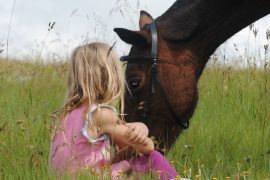Be Playful and Follow the Giggles
Try being playful. Using games that put your child in the powerful role and following their giggles (without tickling) can be very helpful. Unforced laughter not only helps us feel more connected, it also helps us release emotional tension. Here’s how Ravid Aisenman Abramsohn, mother to two, used playfulness:
“It was one of those mornings that are really hard to start. My youngest (6 at the time), was sleeping in more than usual, and I was also dragging myself around the morning routine. By the time she got up and I was ready, it was pretty tight time-wise. I knew if I rushed her to get ready, she would only get mad and we would probably be late for her school.
So, I decided to connect with her more playfully and hopefully get us all out of the door on time.
Instead of looking at the clock and saying: “It’s awfully late. Let’s get ready”, which would be my non-playful version, I pretended to be afraid of looking at the watch and asked her to stay with me and not leave the room.
We were both standing in the bathroom. I ‘fearfully’ tiptoed into the bedroom to get a glance at the watch. That got a lot of laughter going for my daughter. Then we had a quick session of ‘catch and kiss’ because she did not stay in the bed room. All
this time she asked me to ‘cry’ some more about the time and about her leaving me.
We did this once more. It lasted about 12 minutes in all. Only fifteen minutes were left to get her ready for school. Surprisingly enough, she got dressed in a swift, and even had enough time to sit and have breakfast. She was cheerful and calm.
Had I not chosen the playful path I believe we would have had a quarrel, with both of us getting frustrated about our needs not being met. We would have hardly made it out of the house in 20 minutes, and there would be breakfast in the car. I think I’ll stick with the playful path!”
Expect Upsets: Set Limits Early
And even with big doses of connection, our kids might still need us to step in, set limits and listen to their tears. I think it’s really helpful to give up on the idea that there won’t be any upsets or resistance in the morning. Instead, make sure you have time for them. When children become uncooperative, dawdling or inflexible it’s a big red flag that they need some help with their feelings. As tempting as it is to keep reminding children to do something, we help them more when we step in, before we get frazzled, and set limits.
We hear a lot about how children need to be self-regulating, but this doesn’t mean an absence of big feelings. The Bert Powell, from the Circle of Security research project, points out that children need an adult to “be with their feelings” when they experience big emotions. When we stay close, we help anchor a child as the wave emotions passes. In turn they can let out the hurts that are stopping their thinking and feel closer to the person who’s listening them as they let out their upset.
Here’s how Kathy Murphy, mother to two, set limits:
“My 10-year-old son woke up grumpy the Monday morning after a long weekend with his grandparents. He didn’t want to get out of bed, get dressed, or brush his teeth. Each step was a struggle. I finally moved in close, hugged him to me and told him that he
was going to school that day and he needed to get ready.
Little brother was concerned and I told him that his brother had some big feelings to get out and we’d be fine again soon. That cleared it up for him and he let us be. I sat with my older son for about 10 minutes of good crying until the tears subsided and we were just quiet for a time.
Then he got up, got dressed, brushed his teeth and was ready for school. Apparently he had a great day because he came home eager to dig into his owl research homework right away and even crafted his speech two days ahead of schedule.”
Keep it Simple and Get Help
And of course logistics and planning have a part to play. I know many families that have found getting help in the mornings makes a huge difference. Getting a relative, retired neighbour or teenager to come in, even half an hour, can change the whole tone of the morning.
Being organised helps us have space to focus on our children’s emotional needs. There is much sense in doing the bare
minimum in the morning. Do you really need a cooked breakfast? Could hair brushing be left out? What can be done the night before? The less there is to do, the more time you have for connection.
- Want to dive deeper? Join us on a Parenting by Connection Starter Class and explore these ideas indepth and get support as you apply them to your own family.
- Thanks, Credits & References –Thanks to: Hand in Hand Instructors Juli Idleman, Ravid Aisenman Abramsohn and Kathy Murphy for generously sharing their stories with me. Credits: Jennifer Kolari of Connected Parenting for the morning snuggle; Patty Wipfler of Hand in Hand Parenting for the “100 hugs and kisses game”, Special Time, following laughter and Setting limits early. References: Susan Kuchinaskas, “The Chemicals of Connection” 2009
Rachel is a Member of the Australian Association of Family Therapists and runs The Connected Parent. She supports parents to build strong family relationships and compassionately navigate challenges. She lives in the beautiful Bega Valley, Australia where she’s regularly challenged and delighted by her own family. Join her Facebook group.










